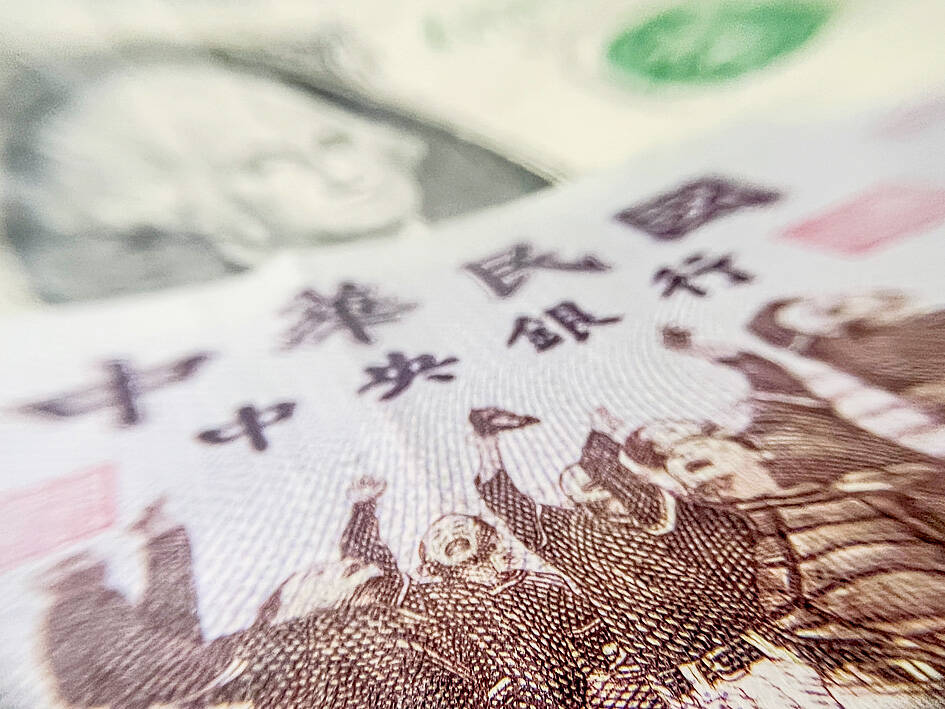Foreign direct investment (FDI) approved by the Investment Commission last year totaled US$11.25 billion, down 15.4 percent from the previous year, but the third-highest since the 2008 global financial crisis.
FDI reached a record US$13.3 billion last year, the highest in 16 years, while the second-highest was in 2018 at US$11.44 billion, the commission said in a report yesterday.
FDI measures the investment activities of foreign firms, including the incorporation of a subsidiary or joint venture, a cash injection into a local unit, or mergers or acquisitions of domestic companies.

Photo: CNA
Despite a setback in FDI last year, foreign companies remain optimistic about Taiwan’s economic prospects, the commission said.
“The average annual FDI was approximately US$10.3 billion from 2016 to 2023, which was much higher than the average of US$5.36 billion from 2008 to 2015, with the top six seen in the past eight years,” the commission said. “This shows that despite the impacts of the COVID-19 pandemic, geopolitical tension and global economic uncertainty, Taiwan is still attractive to foreign investments.”
In particular, investments from New Southbound Policy countries increased 22.45 percent annually to US$2.54 billion, led by Singapore, Thailand and Malaysia, it said.
Taiwan’s FDI excludes investments from China. The commission last year approved US$29.69 million in investments by Chinese firms, a 23.34 percent decrease from a year earlier and marking the lowest since the government lifted a ban on Chinese investments on June 30, 2009, it said.
The commission last year approved a record US$23.58 billion in outbound investments, excluding to China, representing growth of 136.67 percent from the previous year.
That included Taiwan Semiconductor Manufacturing Co’s (台積電) investments of US$8 billion in TSMC Arizona Corp and 3.5 billion euros (US$3.83 billion) in European Semiconductor Manufacturing Co GmbH in Germany; Hon Hai Precision Industry Co’s (鴻海精密) investment of US$800 million in Foxconn Singapore Pte Ltd; and Yang Ming Marine Transport Corp’s (陽明海運) investment of US$800 million on Yang Ming Line (Singapore) Pte Ltd, the commission said.
Outbound investments to China plunged 39.83 percent year-on-year to US$3.04 billion last year, the lowest since 2002, while those to New Southbound Policy countries grew 5.15 percent to US$5.54 billion, which the commission attributed to local firms’ increasing investments in Singapore, Vietnam and Thailand.

NOT JUSTIFIED: The bank’s governor said there would only be a rate cut if inflation falls below 1.5% and economic conditions deteriorate, which have not been detected The central bank yesterday kept its key interest rates unchanged for a fifth consecutive quarter, aligning with market expectations, while slightly lowering its inflation outlook amid signs of cooling price pressures. The move came after the US Federal Reserve held rates steady overnight, despite pressure from US President Donald Trump to cut borrowing costs. Central bank board members unanimously voted to maintain the discount rate at 2 percent, the secured loan rate at 2.375 percent and the overnight lending rate at 4.25 percent. “We consider the policy decision appropriate, although it suggests tightening leaning after factoring in slackening inflation and stable GDP growth,”

DIVIDED VIEWS: Although the Fed agreed on holding rates steady, some officials see no rate cuts for this year, while 10 policymakers foresee two or more cuts There are a lot of unknowns about the outlook for the economy and interest rates, but US Federal Reserve Chair Jerome Powell signaled at least one thing seems certain: Higher prices are coming. Fed policymakers voted unanimously to hold interest rates steady at a range of 4.25 percent to 4.50 percent for a fourth straight meeting on Wednesday, as they await clarity on whether tariffs would leave a one-time or more lasting mark on inflation. Powell said it is still unclear how much of the bill would fall on the shoulders of consumers, but he expects to learn more about tariffs

Greek tourism student Katerina quit within a month of starting work at a five-star hotel in Halkidiki, one of the country’s top destinations, because she said conditions were so dire. Beyond the bad pay, the 22-year-old said that her working and living conditions were “miserable and unacceptable.” Millions holiday in Greece every year, but its vital tourism industry is finding it harder and harder to recruit Greeks to look after them. “I was asked to work in any department of the hotel where there was a need, from service to cleaning,” said Katerina, a tourism and marketing student, who would

i Gasoline and diesel prices at fuel stations are this week to rise NT$0.1 per liter, as tensions in the Middle East pushed crude oil prices higher last week, CPC Corp, Taiwan (台灣中油) and Formosa Petrochemical Corp (台塑石化) said yesterday. International crude oil prices last week rose for the third consecutive week due to an escalating conflict between Israel and Iran, as the market is concerned that the situation in the Middle East might affect crude oil supply, CPC and Formosa said in separate statements. Front-month Brent crude oil futures — the international oil benchmark — rose 3.75 percent to settle at US$77.01